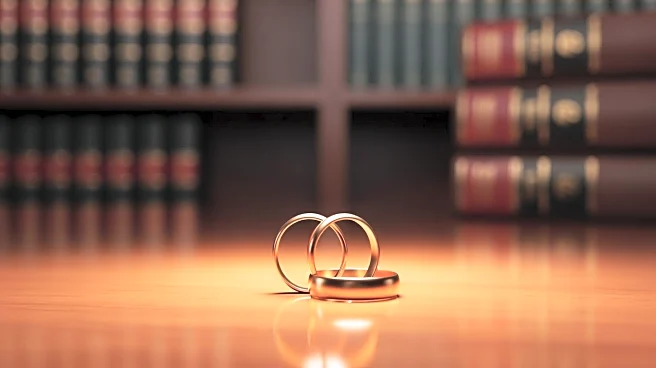What's Happening?
The U.S. Supreme Court has decided not to reconsider its landmark 2015 ruling in Obergefell v Hodges, which legalized same-sex marriage nationwide. This decision comes after an appeal from Kim Davis, a former
county clerk in Kentucky, who refused to issue marriage licenses to same-sex couples citing her religious beliefs. Davis was previously ordered by a lower court to pay $360,000 in damages to a couple, David Ermold and David Moore, for violating their constitutional right to marry. Her appeal argued that the legalization of same-sex marriage was based on a 'legal fiction' and infringed upon her religious liberties. Despite hopes from some conservative groups that the Supreme Court, with its current 6-3 conservative majority, might revisit the issue, the court declined to take up the appeal.
Why It's Important?
The Supreme Court's decision to uphold the legalization of same-sex marriage reinforces the rights of LGBT individuals to marry, maintaining the precedent set by Obergefell v Hodges. This ruling is significant as it underscores the court's stance on civil rights and equality, despite recent conservative shifts in other areas such as abortion rights. The decision also highlights ongoing tensions between religious liberty claims and civil rights protections, a debate that continues to shape U.S. legal and social landscapes. For same-sex couples, this decision affirms their legal right to marry, providing stability and recognition under the law. Conversely, it represents a setback for those advocating for religious exemptions in public service roles.
What's Next?
While the Supreme Court's decision closes the door on this particular appeal, it may not end the broader debate over religious liberty versus civil rights. Legal challenges and legislative efforts could continue to emerge, particularly in states with strong conservative influences. Advocacy groups on both sides of the issue are likely to remain active, potentially influencing future legal interpretations and public policy. Additionally, the decision may impact upcoming elections, as candidates and lawmakers address these contentious issues in their platforms.
Beyond the Headlines
The refusal to revisit the same-sex marriage ruling may have deeper implications for the balance between religious freedoms and civil rights. It could influence how similar cases are approached in the future, potentially affecting other areas where religious beliefs intersect with public duties. This decision also reflects the evolving nature of the Supreme Court's role in shaping societal norms and legal standards, particularly as it navigates complex cultural and ethical issues.










